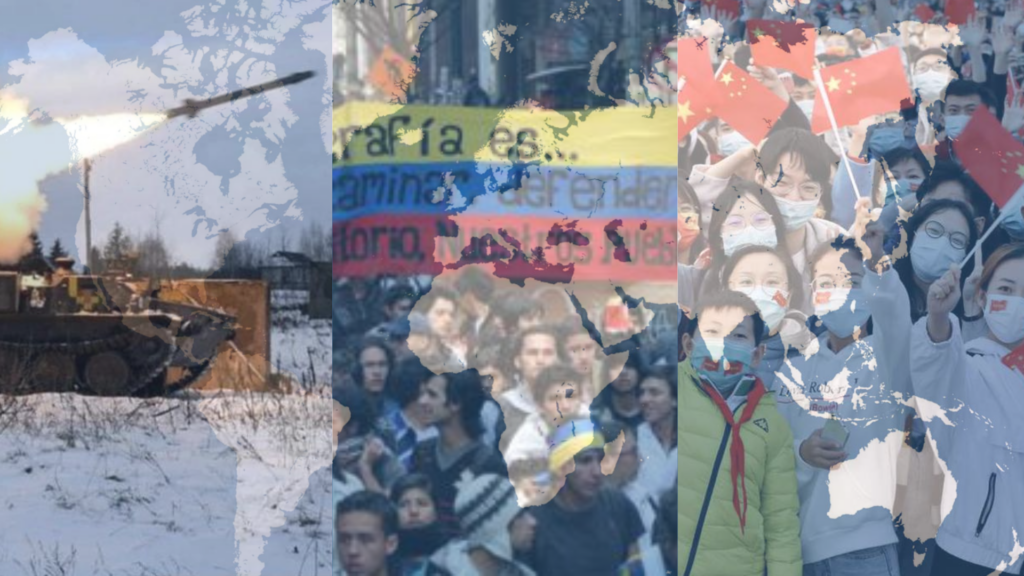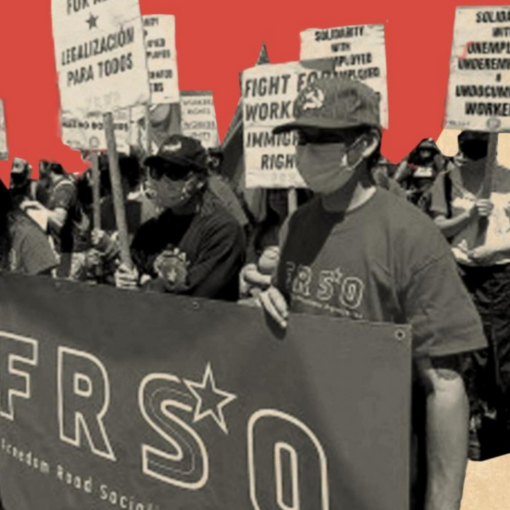
Adopted at the 9th Congress of Freedom Road Socialist Organization in spring 2022
Introduction
A Marxist analysis of the international situation is of real importance for grasping our tasks as revolutionaries in the U.S., as well as understanding the terrain we are fighting on. The U.S. financial oligarchy is at the core of an ugly, tottering imperialist empire that has extended its tentacles around the globe. Any solid understanding of U.S. economics and politics needs to take this reality into account.
The U.S. empire is the result of the development of monopoly capitalism in the U.S. Big corporations want to enrich themselves off the labor, land, and resources of peoples around the world. It is an empire of exploitation.
The political and ideological superstructure that rests on a declining economic base is shaped, in part, by developments on the world stage. After the election of Trump, we stated that he was a reactionary political representative of decaying monopoly capitalism who excelled in shortsighted foreign policy and the promotion of national chauvinism. The existence of similar political currents in Europe is symptomatic of a more generalized decay of imperialism.
Quantitative changes lead to qualitative changes. In 1960, the U.S. economy represented about 40 percent of the world economy. Today, it is about half that. The economy of socialist China is poised to surpass the U.S., and by some measures it has already done so. The crisis of 2008 was a benchmark in the decline of U.S. economic power.
The great Russian revolutionary V.I. Lenin made the point that monopoly capitalism is imperialism. The terms, or categories, of historical development are interchangeable. Imperialism is the most highly developed form of capitalism, and it is capitalism in its final stage. For the wealthy, this doomed system has an unwanted item on its agenda: revolution.
A falling empire
From the end of World War II until the early 1970s, the U.S. was not only the dominant imperialist power, it was also in a period of ascendancy. But that was not to last. As we pointed out at our second Congress (2001), “At the very moment the rich were crowing about the American Century, it was ending. Competition from Europe and Japan, the existence of a Socialist camp, and blows from the national liberation movements came together to end U.S. global hegemony. 1971 marked the end of the U.S. monetary order established at Breton Woods in 1945. Until then, the value of major currencies was fixed against the dollar.”
The subsequent 50 years were characterized by two contradictory processes. On the one hand, the U.S. continued to work to develop multilateral economic institutions that it could dominate — for example, the General Agreement on Tariffs and Trade and later, the World Trade Organization. This was the process of economic integration and regulation, which we call imperialist globalization, that the United States spearheaded since World War II.
On the other hand, the relative decline of U.S. economic power in the context of weakening European and Japanese imperialism has led to a falling out among the capitalist thieves. Inter-imperialist rivalry has become more pronounced, as the law of uneven development asserts itself. Lenin noted that the capitalist countries develop unevenly, and this was a source of friction — including war — between them.
Protectionism is on the rise as imperialist powers attempt to strengthen their respective economic positions — which means strengthening advantages in their internal markets and achieving favorable terms for their exports, including the export of capital.
Imperialist globalization carried with it the seeds of its own destruction. Attempts at big trade deals, like the Doha Rounds, which began in 2001 with a burst of corporate optimism, sputtered to a halt. Instead, there emerged a huge number of bilateral regional agreements which tended to reflect the spheres of influence of the respective imperial powers, such as the Trump-negotiated United States-Mexico-Canada Agreement (USMCA) which replaced the North American Free Trade Agreement (NAFTA), or the desire of imperialist centers to redivide the world in their favor.
War is a continuation of politics by other means, and the continuous wars waged by the U.S. over the last 20-plus years reflect weakness, as opposed to strength. Fighter planes, cruise missiles, and growing military budgets (nearly $1 trillion last year) are an effort to achieve by force what cannot be maintained by economic strength.
The Pentagon’s 2018 National Defense Strategy contains this telling summation: “For decades the United States has enjoyed uncontested or dominant superiority in every operating domain. We could generally deploy our forces when we wanted, assemble them where we wanted, and operate how we wanted. Today, every domain is contested — air, land, sea, space, and cyberspace.”
The decline is picking up speed
The decline of U.S. imperialism picked up additional momentum under the “America First” Trump administration, as the U.S. attacked the apparatus of empire that previous administrations had labored to build since World War II. The downplaying and disruptions of NATO, tariffs on European powers and countries dominated by the U.S., “delinking” from China’s economy, causing a shutdown of the World Trade Organization dispute resolution process, dumping the Trans-Pacific Partnership (TPP), and a host of other moves signaled a turn away from the use of U.S.-led institutions to dominate the world economy. This America-alone policy has isolated the U.S. internationally, and it is both a product of decline and speeds up that decline.
The contours of that accelerating decline can be seen in the intensification and interpenetration of four basic contradictions at work on a world scale: between imperialism and the peoples of the oppressed nations; among the imperialist powers; between the working class and the capitalists, and between socialism and capitalism. The main contradiction in the world remains imperialism versus the oppressed nations.
The end of the U.S.-led occupation of Afghanistan was a good thing — and had been coming for a long time. Long ago, the Afghan resistance successfully pushed the occupiers out of large sections of the countryside. The puppets, along with the puppet masters, were largely confined to the larger cities. Biden’s decision to pull out the last of the troops was a recognition of that defeat.
Biden and danger of war
Trump’s open appeal to racism and national chauvinism rightfully angered many progressives and it is a good thing he was forced from power. That said, the Biden administration is continuing many of Trump’s worst international policies, and his attempts to reassert the U.S. role in the world has the potential of sparking new wars.
U.S. forces continue to occupy portions of Syria and are present in Iraq. The U.S. Embassy remains in Jerusalem. Not only does the U.S. continue the sanctions on Venezuela, but it also still recognizes the pathetic puppet government of Juan Guaidó. Additional sanctions have been placed on socialist Cuba, the Democratic People’s Republic of Korea, and China. From the Philippines to Ukraine, U.S. military advisors have their boots on the ground. The U.S. is escalating the war on Yemen. On issues of foreign policy, there has always been a fair amount of continuity between Democrat and Republican administrations, but that is breaking down. Biden’s proclamation that “America is back!” signals a U.S. desire to return to center stage amid a changing international landscape,and it ups the danger of major wars.
The Department of Defense 2018 National Defense Strategy states, “Long-term strategic competitions with China and Russia are the principal priorities for the Department, and require both increased and sustained investment, because of the magnitude of the threats they pose to U.S. security and prosperity today, and the potential for those threats to increase in the future. Concurrently, the Department will sustain its efforts to deter and counter rogue regimes such as North Korea and Iran, defeat terrorist threats to the United States…” The Biden administration is not only sticking with this, but also amping things up.
The contradictions between U.S. imperialism on the one hand, and China or Russia on the other, are of a different nature. While the U.S. is preparing for war with both, China is a socialist country that spent more than a century under foreign domination.
Russia, however, is an emerging imperialist power. At our 8th Congress we correctly noted, “Under socialism, the former Soviet Union was often guided by working-class internationalism in its relationship with the world. Under Putin, that is not the case. Russia is motivated by what it says is its ‘national interest.’ That said, Russia has played a positive role in a number of places, such as Syria.”
As communists, we get the fact that any war waged by our rulers is, in the final analysis, a war for the profits of big corporations. So we are against any war that is waged with other capitalist powers. U.S. threats of war must be taken seriously and must be opposed.
The rise of socialist China
The rise of the Peoples’ Republic of China is a world-changing process. Socialism with Chinese characteristics has many accomplishments, including bringing an end to extreme poverty — something that is not even a serious goal in the U.S.
China stands out for being able to beat back the pandemic through mass public health campaigns. The fact that fewer than 10,000 people have died of COVID in China, while the U.S. has surpassed a million dead, speaks for itself. Socialism is superior to capitalism.
China pushed forward with the Belt and Road Initiative, forging economic ties throughout Asia and other parts of the world. China, Japan, and other Asian countries just signed a deal called Regional Comprehensive Economic Partnership (RCEP) covering 30 percent of world population and about 30 percent of the world GDP. The U.S. is not part of it.
If the U.S. is not able to maintain its dominance in the Pacific region it will cease being at the center of a world empire. As a result, Washington is stepping up its preparations for a war with China. The Pacific Deterrence Initiative, a more than $7 billion portion of the 2022 National Defense Authorization Act, calls for a massive program of ringing China with ships, missiles, and an alliance of hostile countries.
The U.S. continuously interferes in China’s internal affairs, fueling the turmoil in Hong Kong and encouraging separatist movements in Xinjiang, Tibet, and most importantly Taiwan. Taiwan is a part of China, and it is the great unsolved issue of the Chinese revolution. We support Peoples China’s efforts to defend its territorial integrity and oppose U.S. support for Taiwan’s authorities.
The contradiction between monopoly capitalism and socialism
The existence of socialism in the world today is a very good thing. The collapse of socialism in the former USSR and Eastern Europe for a time gave the U.S. and other imperialist powers more room to maneuver and was a setback for the world’s peoples. The progress made by the five socialist countries is an important barrier to imperialist domination.
We stated the following at our 8th congress:
“The contradiction between the socialist countries (Cuba, Vietnam, China, Democratic Korea and Laos) on the one hand, and the monopoly capitalist countries on the other, is undergoing a process of intensification. In all the socialist countries there are issues of national development, class struggle, the problem of revisionism (meaning the departure from the revolutionary essence of Marxism) and capitalist encirclement. The socialist countries have made many spectacular accomplishments. The economies of those countries do not function according to the laws of capitalism. In general, the socialist countries play a progressive role on the world stage. All evaluations need to be made based on seeking truth from facts.”
Reality has borne this out. From the perspective of understanding the overall motion of developments on the world stage, the contradiction between imperialism and the oppressed nations largely overlaps with the contradiction between imperialism and actually existing socialism.
Inter-imperialist rivalry
Rivalry between the imperialist powers is a basic contradiction in the world today. Trump sharpened the contradictions with the other imperialist powers. The Biden administration says that it wants to see the multilateral institutions of imperialism function under U.S. leadership — a return to the old way of doing things. That will not happen. After Trump, most countries don’t think the U.S. is a reliable partner. So, the U.S. continues to go it more or less alone, for example in relation to Russia, and continues policies like secondary sanctions, which other imperialist powers correctly see as arrogant and hostile to their interests. It is also the case that interests of declining U.S. monopoly capitalism are different that those of Europe — and the gulf between the two is growing greater.
Inter-imperialist rivalry can also be seen in Europe. The disintegration of the EU and moves such as the Brexit are good things, and they serve to weaken European imperialism and provide a more favorable context for the working class of the respective European powers to advance their interests.
While the disintegration of the Soviet Union, the world’s first socialist state, was a major setback to the struggle for revolution, it also led to a new, emerging imperialist power, Russia. Russia is trying to expand its influence in former Soviet states, leading to growing contradictions with the United States in Eastern Europe.
Countries want independence. Nations want liberation. People want revolution!
A great resurgence of the national liberation movement and the international communist movement is underway.
In Asia, the socialist countries are on the rise. The national democratic struggle in the Philippines, led by the Communist Party of the Philippines, stands out in sharp relief and is an inspiration to people everywhere. The Philippines is a crucial base for the projection of U.S. power into the Pacific region. Millions of people are on the move in India, and revolutionary movements are growing in power throughout the region.
In the Middle East, the center of gravity continues to be the heroic struggle of the people of Palestine to end the Zionist occupation and to liberate every inch of their land. A powerful camp of resistance has come into being that unites Iran, Syria, the Palestinian resistance, and the popular forces of Lebanon, Iraq and Yemen — and it is fully capable of challenging imperialism, Zionism, and reaction of all kinds.
In Latin America, a number of countries have broken out of the orbit of U.S. imperialism, including socialist Cuba, the Bolivarian Republic of Venezuela, and Nicaragua. Across the continent, great advances in the popular and revolutionary movements are underway. China has replaced the United States as the biggest trading partner of Latin American countries and is building relationships from the local level up. In Africa, there are sharp struggles against imperialism, particularly in the horn of Africa. China is also playing a positive role throughout the continent and acts as an alternative to imperialism.
We have friends all over the world
Developments abroad can impact the revolutionary process at home. For example, events in Mexico and Central America can have a great impact on Aztlán, the Chicano nation in the U.S. The progress made by the socialist countries is inspiring to a growing number of people.
We are working to build a world united front against imperialism. Part of developing that front is recognizing and supporting the fights of the working class in both advanced capitalist countries and the developing world.
We reject the idea that the people of the U.S. gain material benefits from empire. We hold that the more setbacks and defeats for the monopoly capitalists who rule this country, the closer we are to freedom. We will oppose any imperialist war by the United States, whether it be on a socialist country, national liberation movement, or even another imperialist power.
We are proletarian internationalists who share a common enemy with the world’s peoples: the U.S. bankers and bosses. The existence of this common enemy — coupled with the fact that capitalism anywhere is a roadblock to a society without classes — forms the material basis for internationalism.



